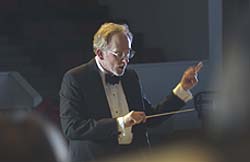Bates College Choir presents Part One of Handel's 'Messiah'
The Bates College Choir, accompanied by a 21-piece orchestra and directed by John Corrie, presents Part One of Handel’s popular oratorio Messiah in performances at 8 p.m. Friday and Saturday, Nov. 30 and Dec. 1, in Olin Arts Center Concert Hall, 75 Russell St.
The ensemble will perform the popular “Hallelujah” chorus from Part Two as an encore. Concert admission is free, but tickets are required. For more information contact 207-786-6135 or this olinarts@bates.edu.
Written in just 24 days in 1741 and considered Georg Friedrich Handel’s masterpiece, Messiah draws from the Old and New Testaments to lay out the Christ story and its significance to humankind. The oratorio’s debut, in Dublin in April 1742, “seems to have been one of those rare times in history when a transcendently great work is immediately perceived at its full value,” writes music historian Jan Swafford.
“There are so many breathtaking moments for both the vocal soloists and the chorus,” says choir director Corrie, a Lewiston resident who is also artistic director of the Maine Music Society. “So many familiar melodies and joyous sounds.”
While the piece is commonly associated with Christmas, its themes pertain to both Christmas and Easter. Because the entire work lasts about three hours, the choir will perform the second and third of its three parts next spring.
“Messiah is one of those milestones that every choral singer should know,” Corrie says. It’s important for singers to learn the entire piece, so by dividing it between two programs he enables them “to learn all of it, but spread out the effort over two semesters of work.”
The choir will consist of some 60 voices, with 11 student soloists featured. The instrumentalists will be drawn from the Bates College Orchestra, the Midcoast Symphony Orchestra and the Maine Chamber Ensemble. Among the musicians is Scott Vaillancourt, music director and organist at Lewiston’s Basilica of Saints Peter and Paul.
“We will be performing Handel’s orchestration,” Corrie notes. “Which means strings, oboes, bassoons, trumpets and timpani, plus organ and harpsichord.” While Mozart and others later expanded the orchestration, he says, “I think it is more important historically for the students to hear what Handel had in mind.”
In order to accompany the vocal soloists and in keeping with the practice of Handel’s time, Corrie will conduct the ensemble from the harpsichord.
The vocal soloists are: seniors Maura Beatty of Watertown, Mass.; Dana Burgard of Kinnelon, N.J.; Alexandra Conroy of Windham; Marshall Karpel of Northampton, Mass.; Joshua Olsen of Berkeley, Calif.; and Lucia Piacenza of Watertown, Conn.; juniors Stuart Ryan of London and Lisa McLellan of Glen Mills, Pa.; sophomores Tom Chapman of Gales Ferry, Conn., and Erica Rogoff of Carlisle, Mass.; and first-year student Blaise Thompson of Iowa City, Iowa.



